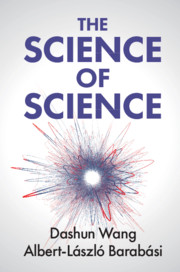Book contents
- The Science of Science
- The Science of Science
- Copyright page
- Dedication
- Contents
- Acknowledgements
- Introduction
- Part I The Science of Career
- 1 Productivity of a Scientist
- 2 The h-Index
- 3 The Matthew Effect
- 4 Age and Scientific Achievement
- 5 Random Impact Rule
- 6 The Q-Factor
- 7 Hot Streaks
- Part II The Science of Collaboration
- Part III The Science of Impact
- Part IV Outlook
- Book part
- References
- Index
7 - Hot Streaks
from Part I - The Science of Career
Published online by Cambridge University Press: 07 February 2021
- The Science of Science
- The Science of Science
- Copyright page
- Dedication
- Contents
- Acknowledgements
- Introduction
- Part I The Science of Career
- 1 Productivity of a Scientist
- 2 The h-Index
- 3 The Matthew Effect
- 4 Age and Scientific Achievement
- 5 Random Impact Rule
- 6 The Q-Factor
- 7 Hot Streaks
- Part II The Science of Collaboration
- Part III The Science of Impact
- Part IV Outlook
- Book part
- References
- Index
Summary
We begin by detailing Einstein’s “miracle year,” during which he published four major discoveries. We discuss the debate over the existence of hot streaks in sports, and ask if a hot-streak phenomenon exists in science. To address this question, we look at the relative timing of hit works during a career, which is captured mathematically by a normalized joint probability. We find that hit works are more likely to colocate than they would by chance, indicating that hot streaks do occur. So while the timing of each highest impact work is random, the relative timing of top papers in a scientist’s career shows a high degree of temporal clustering. To account for these patterns, we introduce a slight variation to the Q-model – a brief period of elevated impact. We call this the “hot-streak model.” The model shows us that hot streaks are ubiquitous across creative careers, that they usually occur only once, and that they occur randomly. We then discuss the implications of these findings for scientists and science administrators, using the life of John Fenn as an example of how the hot-streak model can provide a hopeful framework for scientists still waiting for their big break.
Keywords
- Type
- Chapter
- Information
- The Science of Science , pp. 71 - 80Publisher: Cambridge University PressPrint publication year: 2021

